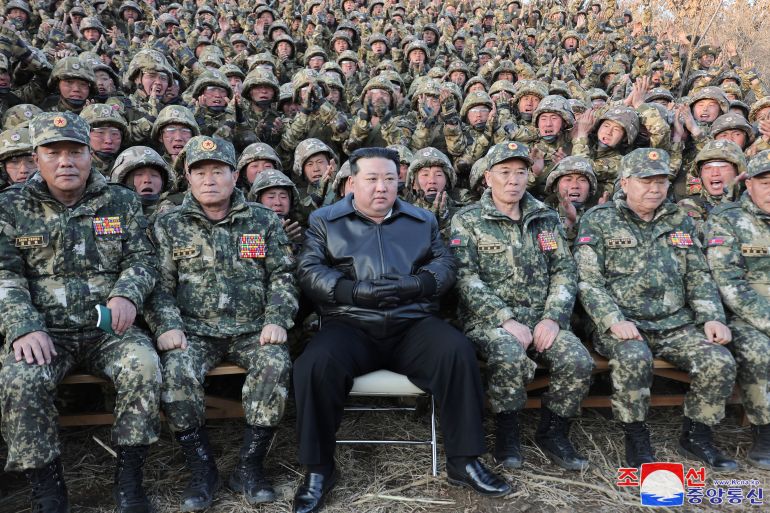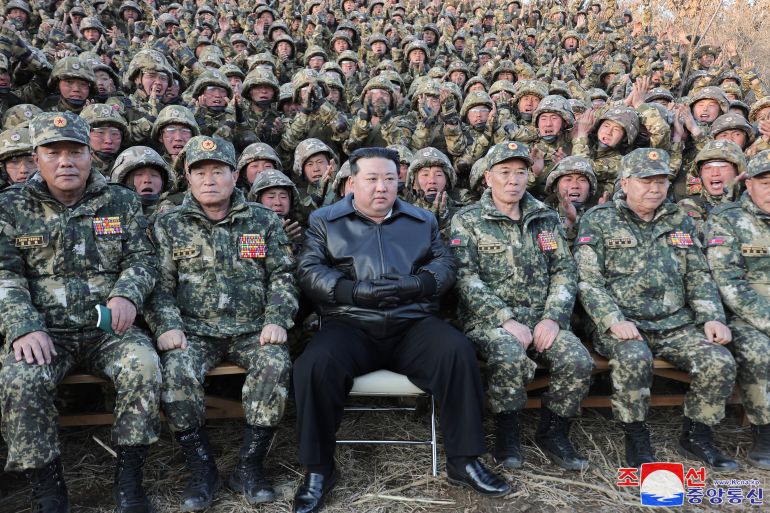North Korean troops reportedly pulled back from Russia-Ukraine front line
Soldiers sent by Pyongyang to Russia’s Kursk region have halted combat after suffering major casualties, South Korea’s security services say.

Published On 4 Feb 20254 Feb 2025
North Korean troops sent to support Russia’s invasion of Ukraine have been pulled off the front lines after suffering major casualties, according to reports.
The roughly 10,000 soldiers that Pyongyang is believed to have sent to fight alongside Russian forces have been absent from the front line for several weeks, South Korea’s Yonhap news agency reported on Tuesday. The report supports claims from Ukraine and US media on the withdrawal of the troops, whose arrival raised fears that the war in Ukraine could escalate.
Recommended Stories
list of 3 itemsend of list
South Korea’s National Intelligence Service (NIS) told AFP news agency that the North Korean units have halted combat operations in Russia’s Kursk region “since mid-January”.
“One reason for this may be the occurrence of many casualties, but the exact details are still being monitored,” said the spy agency.

A Ukrainian military analysis said on Friday that it believed the North Korean soldiers had been pulled back after suffering heavy losses.
Advertisement
Ukraine has previously reported that it had captured or killed numerous North Korean units in Kursk, where it launched a shock cross-border offensive in August.
President Volodymyr Zelenskyy published footage of interrogations with what he said were captured North Korean prisoners.
In mid-January, the NIS estimated that about 300 North Korean soldiers had been killed and a further 2,700 soldiers injured in fighting around the region.
The North Korean deployment to Kursk, which neither Pyongyang nor Moscow have officially acknowledged, was supposed to reinforce Russia’s army and help expel Ukraine’s troops. But nearly six months on, Ukraine still holds significant swaths of territory.
Seoul has previously said that due to the losses suffered by its forces, Pyongyang was preparing an additional deployment.
Kyiv and the West have denounced the involvement of North Korean troops as a major escalation in the three-year conflict since Russia launched its full-scale invasion of its neighbour, during which Pyongyang and Moscow have deepened ties.
Last year, Russian President Vladimir Putin made a rare visit to the nuclear-armed North and signed an agreement with a mutual defence element.
In a New Year’s letter, North Korean leader Kim Jong Un hailed Putin and said 2025 would be the year “when the Russian army and people defeat neo-Nazism and achieve a great victory”.
War from above
While the fighting on the front line in Kursk, and in eastern Ukraine, continues, Moscow and Kyiv continue to wage war in the skies, launching barrages of drones and missiles at one another.
Advertisement
A Russian missile fired on Tuesday on Izyum, in the eastern Kharkiv region of Ukraine, killed four people and wounded 17, the governor reported on social media.
“According to initial reports, the occupiers used a ballistic missile. Four people were killed,” Oleg Synegubov wrote on Telegram, adding that five people had been hospitalised.
In an update, he said that 20 people had been wounded in the strike that targeted the centre of the town, which lies some 40 kilometres (25 miles) from the front lines. Izyum was occupied for several months at the beginning of the war before being retaken by Ukraine.
However, Russian forces have been making gains in eastern Ukraine over recent months thanks to superior troop numbers and weapons supply.
The North Korean troops in Kursk were intended to help maintain that superiority.
Quid pro quo
Meanwhile, Ukraine is nervously eyeing the return of Donald Trump to the United States presidency, fearing that it could fall further behind in the arms race should he cut Washington’s military support.
Trump, who has put a hold on practically all US foreign aid, suggested overnight on Tuesday that he wants rare earth minerals in return for maintaining the supply of arms and other support.

The US president claimed that Ukraine was willing to engage in the exchange, adding that he wants “equalisation” from Ukraine for “close to $300bn” in support.
The Kremlin was swift to jump on the reports, with a spokesperson declaring that Trump’s words illustrate that the US will no longer provide unconditional support to Kyiv.
Advertisement
